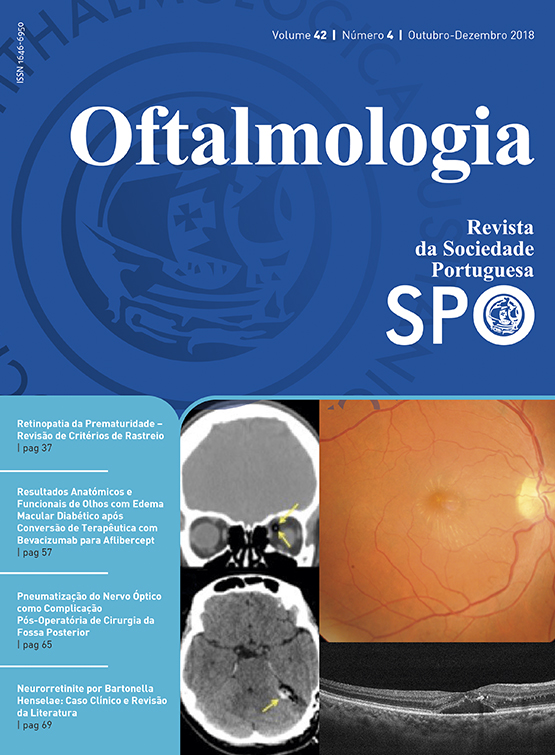Idiopathic choroidal neovascularization in a 10 year-old child treated with intravitreal bevacizumab injections
DOI:
https://doi.org/10.48560/rspo.13416Palavras-chave:
idiopathic choroidal neovascularization, pediatric vision impairment, anti-VEGF treatment in childrenResumo
Purpose: to report a case of idiopathic choroidal neovascularization (CNV) in a pediatric patient successfully treated with intravitreal bevacizumab injections. Methods: case report of a 10 year-old patient, who presented with reduced unilateral visual acuity during a visual screening. Complete ophthalmological examination was performed, along with fluorescein angiography, spectral domain optic coherence tomography (SD-OCT), fundus autofluorescence, ocular ultrasound, magnetic resonance imaging (MRI) of the brain and orbits and infectious serologies. Results: visual acuity was 20/400 in the left eye (OS) and 20/20 in the right eye (OD). No significant refractive error was detected. Fundoscopy in OS revealed a subretinal macular lesion associated with subretinal hemorrhage and fluid. Fluorescein angiography and SD-OCT confirmed the presence of NVC. Retinal hereditary dystrophies, along with infectious and neoplastic causes were excluded. The patient underwent two intravitreal bevacizumab injections in OS with a 3 months interval. Treatment resulted in progressive fibrosis of NVC, resolution of subretinal fluid and improvement of visual acuity in OS to 20/125, which remained stable 4 years after treatment. Conclusions: In the case of pediatric NVC, retinal hereditary dystrophies along with infectious and neoplastic causes should be excluded after a thorough investigation. No standard treatment for CNV in children has yet been validated. In our patient anti-vascular endothelial growth factor (VEGF) treatment induced regression of the CNV and resolution of subretinal fluid with a modest recovery in visual acuity and no reported ocular or systemic side effects.
Downloads
Downloads
Publicado
Como Citar
Edição
Secção
Licença
Não se esqueça de fazer o download do ficheiro da Declaração de Responsabilidade Autoral e Autorização para Publicação e de Conflito de Interesses
O artigo apenas poderá ser submetido com esse dois documentos.
Para obter o ficheiro da Declaração de Responsabilidade Autoral, clique aqui
Para obter o ficheiro de Conflito de Interesses, clique aqui





